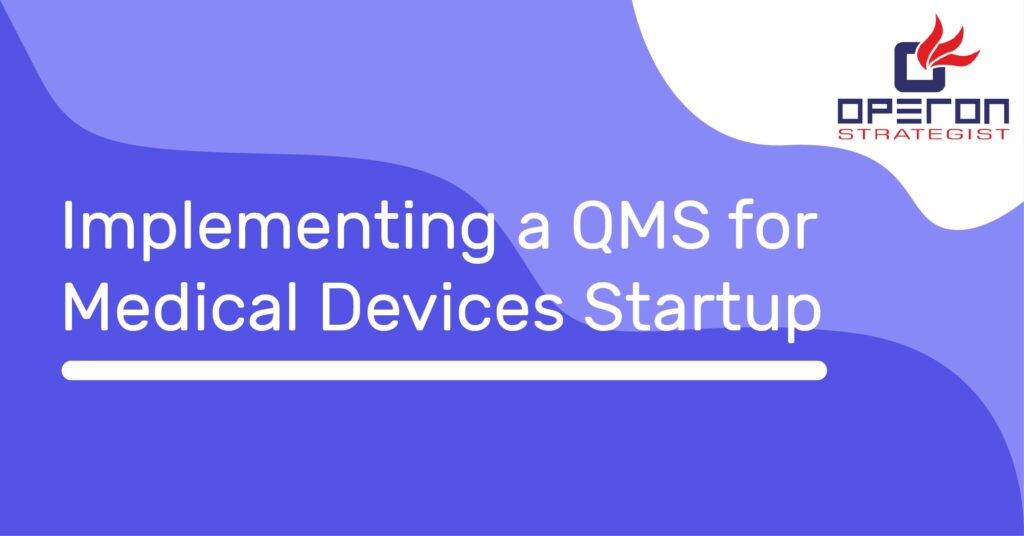Implementing a Qms for Medical Devices Startup and maintaining a (QMS) is a crucial part of regulatory compliance for most markets worldwide. For small medical device manufacturers in the pre-production phase, an initial implementation of a partial quality system is an extremely beneficial way to ensure compliance with product development regulations, such as Design Controls.
A QMS is simply a system that documents all the procedures and processes you use in the design, manufacture, and distribution of your device. This includes risk management, supplier management, product labeling, complaint handling procedures, and much more.
- QMS certification service including QMS certification training, layout designs, manufacturing and post market support as we have regulatory expertise in auditing, executing and maintaining all features.
- Our team involves in former U.S. FDA, EU notified body, QMS certification body and Medical Devices Agency professionals with the well built technical expertise
Looking Forward To QMS certification Consultant For Medical Devices ?
QMS certification service including QMS certification training, layout designs, manufacturing and post market support as we have regulatory expertise in auditing, executing and maintaining all features.
Medical devices startups requires manufacturers to implement and maintain a QMS. In the US, companies must comply with FDA’s Quality System Regulation (QSR), which can be found in 21 CFR Part 820. However, the FDA enforces that compliance through formal inspections, so it’s essential that your QMS is prepared to withstand scrutiny at all times. In Europe, ISO 13485 is the standard that manufacturers follow when implementing their QMS. For all but the lowest-risk device class, demonstrated compliance with ISO 13845 is necessary to obtain the CE marking that allows a product to be sold in the EU.
Implementing a Qms for Medical Devices Startup it ensures a safe, reliable product. While a good quality system encompasses best practices at a company and makes the most of each employee’s work, a bad one hinders progress at every step in development and results in lots of frustrated employees. Implementing a Qms for Medical Devices Startup taking the time to create a good QMS – one that emphasizes good processes over documentation and focuses initially on implementation and training–is one of the secrets to building a successful medical startup. It’s also something that you have complete control over (unlike tricky technical challenges, marketing challenges, etc.).
Read More Article
- Qms system for medical devices
- QMS Certification training for medical devices
- Medical device Qms procedures
Implementing a Qms for Medical Devices Startup
While a quality system typically does not have to be fully implemented until you begin your medical device registration, implementing an initial partial QMS system can make implementing a full QMS less burdensome, and may shorten your time to commercialization in the long run. A pre-production QMS is ideal for medical device manufacturers that are 18-24 months away from commercialization and distribution.
The benefit for this approach is to allow the organization to build and improve their quality system as they proceed through design and development, validation testing, conducting clinical trials, and eventually market launch. If you\’re researching Quality Management Systems, you\’re likely already aware that QMS can mitigate regulatory risk by helping your organization comply with requirements and standards for quality-driven operations. However, risk reduction isn\’t the only noticeable benefit. An effective QMS can have a transformative impact on company culture by creating a formal system of process, procedure, responsibilities, and software.
The Top 5 Benefits of Implementing a Qms for Medical Devices Startup
Implementing a Qms for Medical Devices Startup such as ISO 9001:2015 provide a comprehensive blueprint for customer-focused quality management based on principles for leadership, the workforce, processes, improvement, evidence-based decisions, and relationships. Research confirms that Implementing a Qms for Medical Devices Startup such as ISO 9001 or 13485 can offer near-term benefits to adopting organizations.
- It establishes your company processes in a way that aligns with regulatory expectations.
- It establishes a framework for how you do business.
- It defines expectations and deliverables for key processes.
- Documenting Design Controls + Risk Management are key to product development success. And both are also critical parts of building a QMS foundation.
- QMS efforts need to start during product development and evolve as you get closer and closer to market release.
Implementing a Qms for Medical Devices Startup is a requirement It is not optional. You would be surprised how many companies believe that their med device is not “significant” enough to need a QMS.Being a medical device company means certain expected behaviors are required. And having a QMS that aligns with regulations is definitely an expected behavior.
The overall purpose of Implementing a Qms for Medical Devices Startup is to establish the framework and requirements of your medical device company. Your QMS establishes your company processes. Your company rules. Your company expectations. How you do things. What documents and records you generate.



